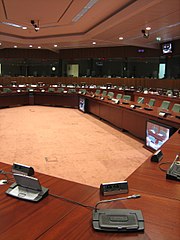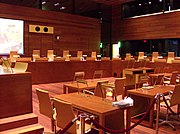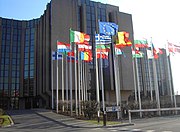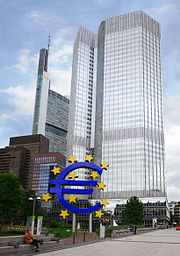The European Union has created seven main institutions:
 European Parliament European Parliament
- Legislative (lower house) -
|
|
 European Council European Council
- Sets impetus and direction -
|
|
 Council of the European Union Council of the European Union
- Legislative (upper house) -
|
|
 European Commission European Commission
- Executive -
|
|
|
|
|
|
- acts together with the Council as a legislator
- shares with the Council the budgetary power and decides in the last instance on the general budget of the EU
- exerts the democratic control over EU institutions including the European Commission and appoints the Commission members
- based and plenary sessions in Strasbourg, General Secretariat in Luxembourg, primarily meets in Brussels
|
- summit of the Heads of Government, chaired by the President of the European Council)
- gives the necessary impetus for the development and sets out general objectives and priorities
- will not legislate
- based in Brussels
|
- acts together with the Parliament as a legislator
- exerts together with the Parliament the budgetary power
- ensures coordination of the broad economic and social policy and sets out guidelines for the Common Foreign and Security Policy (CFSP)
- conclude international agreements
- based in Brussels
|
- is the "government"
- submits proposals for new legislation to the Parliament and to the Council
- implements EU policy and administers the European Union budget|budget
- ensures compliance with EU law
- negotiates international treaties
- based in Brussels
|
|
|

|
Court of Justice of the European Union
- Judiciary -
|
|
 European Court of Auditors European Court of Auditors
- Financial auditor -
|
|
 European Central Bank European Central Bank
- Monetary executive (central bank) -
|

|
|
|
|
|
- ensure uniformity of interpretation of European law
- has the power to decide legal disputes between EU member states, EU institutions, businesses and individuals
- based in Luxembourg
|
- shall examine the proper use of revenue and expenditure of the EU institutions
- based in Luxembourg
|
- forms together with the national central banks the European System of Central Banks and thereby determining the monetary policy of the EU
- ensures price stability in the eurozone by controlling the money supply
- based in Frankfurt am Main
|












